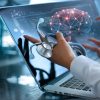As we edge closer to the future, it’s becoming increasingly clear that healthcare is poised for a major overhaul. With Artificial Intelligence (AI) on the rise, doctors are now able to diagnose patients with greater speed and accuracy than ever before. From detecting diseases early on to creating personalized treatment plans, AI is revolutionizing how
As we edge closer to the future, it’s becoming increasingly clear that healthcare is poised for a major overhaul. With Artificial Intelligence (AI) on the rise, doctors are now able to diagnose patients with greater speed and accuracy than ever before. From detecting diseases early on to creating personalized treatment plans, AI is revolutionizing how doctors approach patient care. In this blog post, we’ll explore the exciting ways in which AI is transforming the landscape of medicine and paving the way for a brighter and healthier tomorrow.
What is AI?
What is AI?
Artificial intelligence (AI) is a subset of machine learning that employs computer programs to make decisions, typically related to tasks such as identifying patterns or trends. In healthcare, AI can be used to improve the accuracy and speed of diagnoses, as well as guiding patient care.
How is AI Revolutionizing the Way Doctors Diagnose Patients?
AI is revolutionizing the way doctors diagnose patients. For example, Google DeepMind’s AlphaGo artificial intelligence program defeated world champion Go player Lee Sedol in March 2016. AlphaGo used deep learning algorithms to learn from past game play and understand complex strategical concepts. By understanding human behavior and strategy, AlphaGo was able to make better decisions in future games. This technology could eventually be used by doctors to diagnose patients more accurately and faster.
AI also helps doctors probe for hidden clues in medical images and videos. For example, IBM’s Watson cognitive computing system was used in 2017 to helpdiagnose lung cancer with MRIs. Watson analyzed millions of images of lungs taken by doctors around the world and identified abnormalities that would otherwise have gone undetected. This technology could eventually be used by physicians to identify health issues earlier, allowing for more effective treatment plans.
How is AI being used in healthcare?
The future of healthcare is looking brighter than ever thanks to the advances of artificial intelligence (AI). AI has the potential to revolutionize the way doctors diagnose patients, and it could even lead to new ways of treating diseases.
One example of how AI is being used in healthcare is through machine learning. Machine learning helps computers learn without being explicitly taught. This technology is being used to improve the accuracy of diagnoses by detecting patterns in patient data.
Another way AI is being used in healthcare is through natural language processing (NLP). NLP enables computers to understand human language, which can be helpful when diagnosing patients. For example, a computer could use NLP to extract information from a doctor’s note about a patient’s symptoms.
AI also has the potential to help doctors manage medical records. For example, AI could help doctors identify which patients are likely to experience complications after surgery. AI could also help doctors track the progress of patients who are receiving treatment for cancer.
Overall, AI has the potential to revolutionize the way doctors diagnose patients and manage medical records. It’s still early days for this technology, but it looks like it has great promise for the future of healthcare
The benefits of AI in healthcare
There are a number of reasons why artificial intelligence (AI) is becoming increasingly important in the healthcare field. AI can help doctors diagnose patients more accurately and rapidly, which can save both time and money. Additionally, AI can also help doctors identify potential risks associated with certain treatments or patient scenarios, which could prevent serious accidents or injuries. Finally, AI can provide physicians with valuable insights that they may not have otherwise been aware of. Taken together, these benefits could lead to significant improvements in the quality of healthcare delivery across the board.
The challenges of AI in healthcare
In healthcare, AI is revolutionizing the way doctors diagnose patients. By automating tedious and time-consuming tasks, AI can help healthcare providers save time and provide better care for their patients.
However, there are some challenges to implementing AI in healthcare. For example, training computers to accurately analyze medical images can be difficult and time-consuming. Additionally, many doctors are not yet comfortable with using AI in their practices. Nevertheless, as AI continues to evolve and become more reliable, it will play a crucial role in improving the quality of healthcare services around the world.
Conclusion
As artificial intelligence (AI) continues to evolve, it is becoming more capable of performing routine medical tasks that have traditionally been performed by doctors. This shift away from human-led diagnostics is only going to continue as AI becomes increasingly sophisticated and pervasive in the healthcare industry. While there are still some kinks to be worked out, such as how best to manage patient data privacy and safety, the future looks bright for those who embrace AI-assisted diagnostics.





















Leave a Comment
Your email address will not be published. Required fields are marked with *